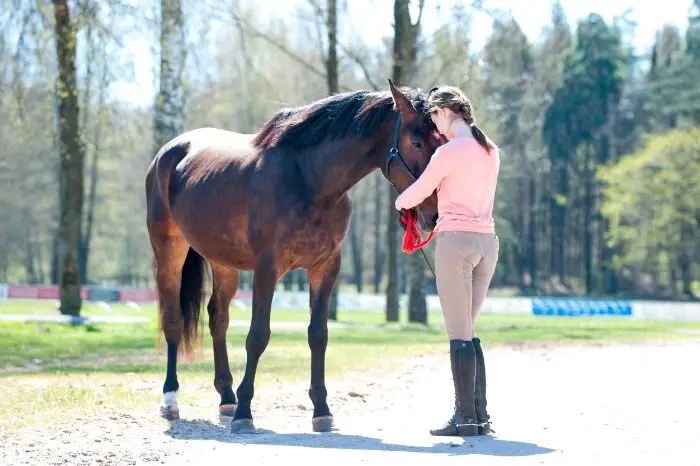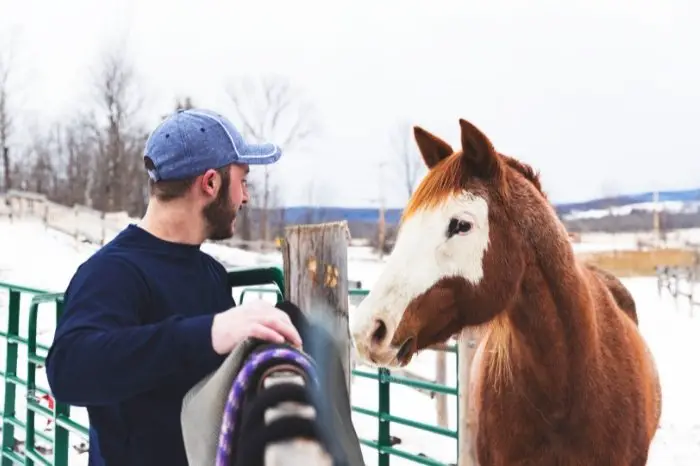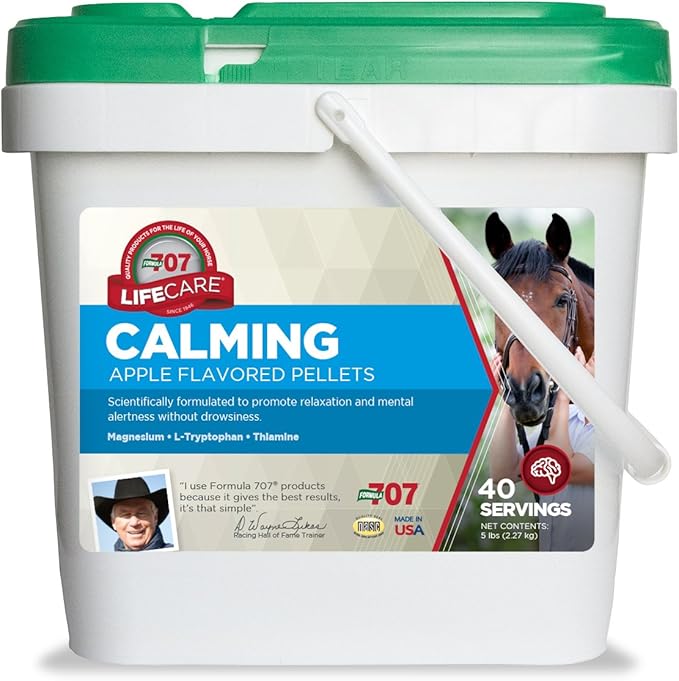Last Updated on October 23, 2021
All horse riders and lovers would like to think that their horses love them as equally as we adore them! But how do we know this for sure? If you want to know how to tell if your horse likes you, keep reading to find out more.
To understand if your horse likes you, you need to learn about horse facial expressions and what they mean. Horses have very subtle methods of communication and it is not always easy to know what they are trying to tell us. But, if we can learn to read their signals, it can be fun to find out what they are thinking!
How To Tell If A Horse Likes You
To understand what a horse is thinking, we need to find out what he is trying to communicate to us. They do this in a range of different ways, using many parts of their body. In fact, the facial expressions of a horse may be almost as complex as human facial expressions.

Let’s find out how to understand basic horse language signals:
-
Ears
A relaxed horse will have ears that are slightly droopy, neither pointed forward or backward. The ears may swivel around gently to pick up sounds from different directions.
If a horse has its ears flat back this is a sign that it is feeling threatened or uncomfortable. This is a warning signal for you to back off, and should be heeded!
A horse that is on high alert will have its ears pricked forwards. This enables it to listen for sounds from a long distance away.
-
Eyes
Learning to read the eyes of a horse is a difficult skill. Look carefully at your horse’s eyes in different situations to help you understand this facial expression.
When calm and relaxed, the muscles around the eyes will not show any sign of tension. This is described as a horse having ‘soft eyes’.
When they are tense or frightened, the facial muscles are tightened and you will see the tension around the eyes. The eyes will seem wider and you may see the whites of his eyes.
-
Muzzle
If your horse has a relaxed muzzle, with loose lips, he is feeling calm and happy. He may use his lips to nuzzle you, or even groom you in the same way he does his best equine buddy. When worried or frightened, the horse will tighten its lips and the mouth will appear smaller.
A chewing action and lip licking is a sign of submission, normally shown by foals and young horses.
Formula 707 Calming Equine Supplement 10LB Bucket – Anxiety Relief and Enhanced Focus for Horses
-
Noises
One of the cutest noises horses make is something referred to as a ‘nicker’. This is an incredibly cute sound, almost like a little chuckle made through the nostrils. Horses use this sound in their natural environment to their closest equine friends, and to reinforce the bond between a mare and foal.
Horses are also well known for neighing, a loud sound made to call to other horses. They sometimes also snort – this is an expression of surprise or fear.
-
Tail
A relaxed horse will stand with its tail held loosely, perhaps moving it gently from side to side. When threatened, this action is much more aggressive, and most horse lovers know not to approach a horse who is swishing its tail!
If your horse has his tail raised, that is normally a sign that he is excited. A tail that is clamped down tightly is a sign of nerves and tension.
Does My Horse Love Me?
Learning the horse’s body language is the best way to find out how to tell if your horse likes you. Signs that your horse likes being in your company include:
- A gentle nicker sound when he sees you
- He comes to you when he is called
- He seems relaxed and calm in your company
- When you are grooming him, he often tries to groom you back
- He follows you around the field or barn, even when you don’t have a halter on him

But are any of these signs actually feelings of love? Whether horses feel love is something we do not fully understand, as we cannot read their emotions.
In their natural environment, horses create close bonds with other horses, as well as with their offspring. They will become distressed when separated and spend as much time together in the herd as possible. If your horse treats you in the same way, then he certainly likes you just as much as his equine friends!
Signs That A Horse Trusts You
Building a bond of trust is vital for creating the ultimate horse and trainer partnership. Horses cannot be forced and bullied into cooperating with us. They must learn to trust us and what we are telling them, and then they will endeavor to please us.
If your horse follows your cues and instructions, this is a sign that he trusts you. Horses are naturally very wary of anything dangerous and will not put themselves at any risk. So, for a horse to go along with what you ask of it, it must have a high level of trust in your judgment.
Signs that a horse trusts you include a relaxed and calm demeanor in your presence. He will not show any signs of tension or fear when you enter the stable and is happy to accompany you to unfamiliar situations. If your horse attempts to bond with you by nuzzling and mutual grooming, then he most definitely trusts you!
Summary
So, as we have learned, it can be difficult to tell if your horse likes you or if it is just looking for food! Horses have some very complex facial expressions, and it takes time to learn what they all mean. If your horse shows you the same signals as to his favorite equine friends, then he probably does like and perhaps even love you.
We’d love to hear about your experiences – do you know how to tell if your horse likes you? Or is your pony a grumpy old boy who doesn’t seem to like people at all? Add a comment below this post and we’ll get back to you!

Kate Chalmers is a qualified veterinary nurse who has specialized in horse care for the vast majority of her career. She has been around horses since she was a child, starting out riding ponies and helping out at the local stables before going on to college to study Horse Care & Management. She has backed and trained many horses during her lifetime and competed in various equestrian sports at different levels.
After Kate qualified as a veterinary nurse, she provided nursing care to the patients of a large equine veterinary hospital for many years. She then went on to teach horse care and veterinary nursing at one of the top colleges in the country. This has led to an in-depth knowledge of the care needs of horses and their various medical ailments, as well as a life-long passion for educating horse owners on how to provide the best possible care for their four-legged friends.
Kate Chalmers BSc (Hons) CVN, Dip AVN (Equine) Dip HE CVN EVN VN A1 PGCE

